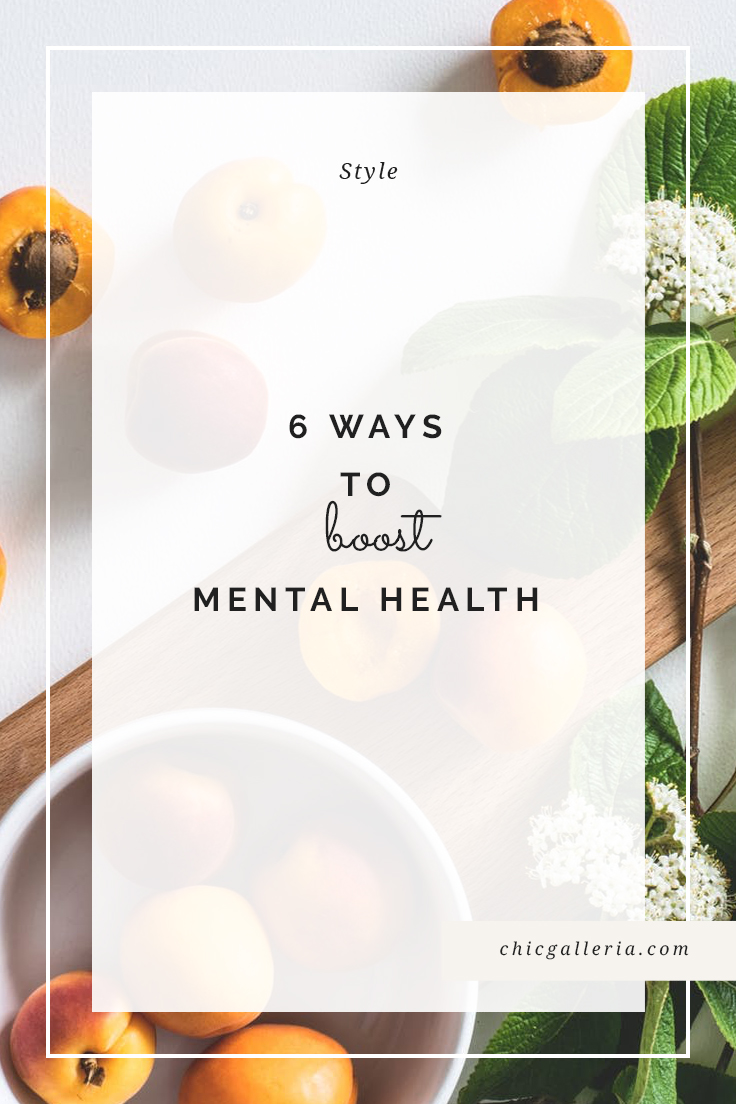
Your emotional well-being is equally important to your physical health. The two coincide with one another to help you feel and function at your best. If you’re looking to take another step forward in the personal development department, turn to these six ways to boost your mental health:
1. Integrate meditation into your daily routine
Everyone can benefit from a little more self-awareness. Meditation helps us become comfortable with our thoughts and emotions because the practice encourages us to allow both to flow through our minds freely, and not to suppress what we actually feel. There are many different styles of meditation to choose from, such as guided visualization meditation or Qi Gong, so finding one that suits you and your mental goals won’t be an issue! Subsequently, you will find that reflection naturally occurs when meditating which will strengthen your sense of introspection and the ability to remain in the present. Regardless of whether you meditate for five minutes or twenty, from the action of taking a moment for yourself to slow down will ultimately improve your state of mind and reduce your stress response.
2. Silence your inner critic and negative self-talk
Human beings are inherently self-critical, which can prove to be harmful at times. Criticism is useful only when it’s constructive, not destructive. Now, we all have our inner critic and negative thought patterns, but can we honestly say that we speak to ourselves with kindness in the midst of that criticism? Instead of allowing your inner critic to be a constant presence in your mind, silence it. Unnecessarily berating yourself will only damage your self-esteem and drive you into developing depression and anxiety. Therefore, learn how to challenge your negative thoughts and stop surrendering to them, and have more compassion for yourself rather than self-blame. Focus on your strengths, celebrate your accomplishments, and use your failures and mistakes as motivators to succeed in the future.
3. Prioritize self-care
Self-care is not the same thing as treating yourself. It’s the act of intentionally making an effort to maintain your entire well-being. Taking care of yourself shouldn’t be seen as a luxury. Rather, it should be an everyday priority. Basic methods of self-care include showering, eating three meals a day, getting enough sleep, keeping up with personal hygiene, and knowing when to take a step back from your life when necessary. Initially, those actions may not seem like much, but they have a significant impact on your day-to-day life. Without self-care, we would not be able to function properly nor ever feel our best. Something I personally like to do that may work for you as well is to maintain a manicure at home every week. Instead of going to the salon, I take about fifteen minutes every Sunday to remove my chipped nail polish, file my nails, and repaint them. Yes, manicured hands don’t exactly change the world or help you accomplish goals, but they do make you feel slightly lighter and happier to be typing away at the office - and there’s nothing wrong with wanting that. Plus, everyone loves a great manicure!
4. Pick up a book
Aside from emotional well-being, your general cognitive function can definitely improve as well. As we grow older, our brains naturally decline and age, which can lead to the development of memory loss and Alzheimer’s Disease. Reading can help combat that! Additionally, reading helps us cultivate a deeper sense of empathy. Through the stories of fictional characters, we inevitably put ourselves in their shoes, experience their struggles and short-coming alongside them, and come to find that we can apply current events in our lives to that of the novel. After you finish reading a book, you learn to understand the world, your loved ones, strangers around you, and even yourself, a little bit more.
5. Utilize creative outlets
Being unable to express how you feel one of the most frustrating experiences. That’s why creative outlets can come into the picture. They help you release and express your emotions in a healthy way, instead of pushing you to take out your feelings on someone else or a utilize an unhealthy coping mechanism. For example, you can free-write in a journal without worrying about grammar or if your sentences make sense. No one needs to see this journal except for you! Alternatively, you can throw paint splatter on a canvas or recreate the scenery around you in a sketchpad. You don’t need to be a professional artist to enjoy what creativity has to offer.
6. Don’t be a lone wolf
No matter how many times we tell ourselves we can do everything on our own, that’s just not possible. We’ll always need the help of others sometimes! Seeking support or help from loved ones or people you trust should never be seen as a sign of weakness nor a step backward. Why would you have meaningful relationships and friendships in the first place? They are cultivated from the equal and mutual desire from both parties to encourage each other’s happiness, well-being, and success and always support the other when needed after all.
*Collaborative post






Leave a Reply